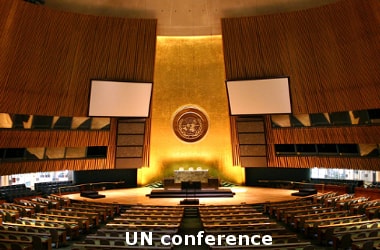
The United Nations conference to ‘negotiate a legally binding instrument to prohibit nuclear weapons, leading towards their total elimination’ took off at the UN headquarters in New York on 27 March 2017.
The meeting was attended by more than 100 countries.
The United States, leading a coalition of more than 40 countries including Britain and France boycotted the talks. India too chose to skip the meeting
The countries skipping the negotiations are instead committed to the Non-Proliferation Treaty that was brought into force in 1970 and is aimed at preventing the spread of nuclear weapons and weapons technology.
France and UK’s ambassadors to the UN also spoke against the ban treaty negotiations saying that the security conditions were not rights to disarm the nuclear states.
The countries leading the ban effort include Austria, Ireland, Mexico, Brazil, South Africa and Sweden. Their efforts are being backed by hundreds of NGOs.
Among the non-nuclear states opposing the ban treaty, Australia has been the sole one in its neighbourhood to side with the nuclear-armed nations and boycott the negotiations for a new global treaty.
Indonesia, Thailand, New Zealand and Papua New Guinea are the prominent countries among the regional ones that have agreed to push for the abolition of nuclear weapons.
Negotiating a ban without the participation of countries possessing nuclear weapons would not help the goal of reductions in nuclear arsenals.
The United Nations General Assembly adopted a resolution in December with 113 votes in favour, 35 against and 13 abstentions that decided to “negotiate a legally binding instrument to prohibit nuclear weapons, leading towards their total elimination” and encouraged all member states to participate.
The ban treaty was opposed by all nine known nuclear-armed states – the US, China, France, Russia, India, UK, Pakistan, Israel and North Korea.
While the United Kingdom, the United States, France, Israel and Russia voted no, China, India and Pakistan abstained from voting. Japan also voted against the talks.